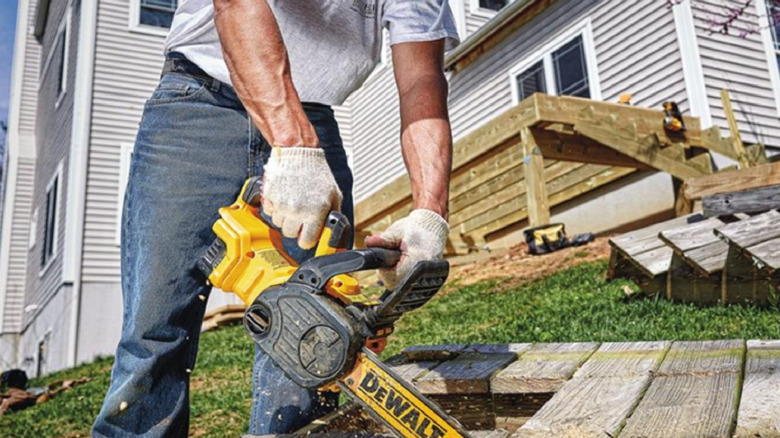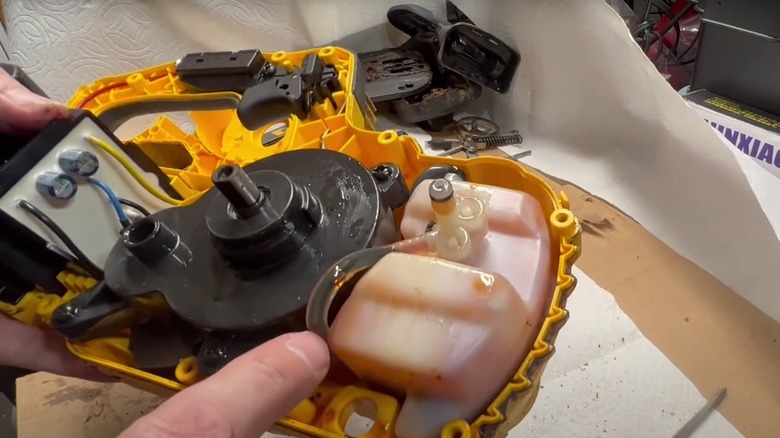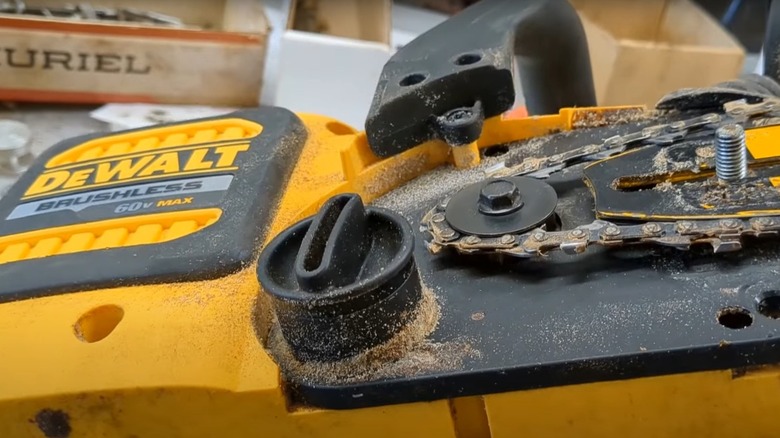Common Problems With DeWalt Chainsaws (According To Owners)
We may receive a commission on purchases made from links.
The DeWalt line of chainsaws is a mixed bag. For instance, the brand's 20V MAX XR chainsaw made it onto the list of DeWalt products you should avoid at all costs, while the 60V MAX 20 Brushless cordless chainsaw is considered one of the best chainsaws you can buy in 2025. Of course, each model has its own strengths and weaknesses. However, there are some common problems throughout the DeWalt chainsaw catalog worth keeping in mind before you start buzzing through trees.
The majority of DeWalt chainsaw issues surround the oil, stemming from design flaws. Currently, DeWalt chainsaws are entirely electric models. There are a few corded models, such as the DeWalt 18-inch corded chainsaw, but the majority are battery-operated. Because DeWalt chainsaws operate on electricity, they all use a separate reservoir for oil — no gas-oil mixing required. But this can be a blessing and a curse. The oil reservoirs on DeWalt chainsaws are notorious for leaking, with oil complaints cropping up across user reviews on the DeWalt website, retailer sites like Home Depot, YouTube videos, and Reddit threads. Sometimes such issues are minor, and other times they become a huge headache.
Minor oil-leak issues are fixable. In a hands-on review from TheToolGuyD, user Benjamen Johnson complains about how flimsy the oil cap is on the basic DeWalt 20V Max. The sentiment is echoed across the web. Some users reported that the cap simply doesn't fit properly, while others came up with their own solutions to prevent leaking. The problem is most common with the smaller 20V models, so much so that the DeWalt support team suggests installing your own O-ring in the cap of the DCCS620 to prevent leaking. However, owners of larger 60V DeWalt chainsaws complain about oil leaks occurring in other places, not just the cap.
System-wide oil issues across the product line
When a Reddit user reached out to the community in 2022 looking for answers, their initial concern was that their 60V DeWalt chainsaw was leaking oil from the handguard area. But before long, they gave an update: the machine began leaking "from every crack and crevice." After a day of cutting, the user had gone through an entire half-quart of bar oil. Some users replied sarcastically, claiming that such excessive oil leakage was a design "feature" of DeWalt chainsaws. But are DeWalt chainsaws actually meant to waste so much oil?
Bar-and-chain oil continuously lubricates the chain while the chainsaw is in use, but it's not meant to leak out all over the machine. YouTuber "Pepper Moon Garage" disassembled his entire DeWalt chainsaw to investigate the cause of this common problem. He discovered that the oil reservoir was leaking in multiple areas along the seams of the gasket. Many other users have reported disassembling their DeWalt chainsaws to find the source of leakage, with some discovering the cap was indeed the problem and others finding leaks along all the ports throughout the system. In any case, the best fix is to seal any leaks with an oil-resistant sealant like Permatex Gasket Maker.
But excessive leaking right out of the box shouldn't be on the customer to fix. Many users who bought "a lemon" simply returned their chainsaws after oil-leak frustrations. Depending on the exact cause of the leakage, DeWalt's warranty policy may cover it — though the brand's chainsaws only have a 3-year limited warranty, unlike some of its lifetime-covered products. DeWalt suggests emptying out the oil after every use and storing the chainsaw on its side or hanging. To this, one user says, "DeWalt's 'solution' to drain the oil after every use......hurts my head."
Chain tension problems — Jumping chains and loose hardware
Most chainsaws require tension adjustments every now and then, so it's a good idea to learn how to adjust the slack on your own. But when it comes to DeWalt, loose chains occur more frequently than is normal. According to users, it seems DeWalt chainsaws are prone to chain "jumping," which is when the chain slips off the bar. The cause of this frequent issue is often poorly-fitted hardware within the tensioner system.
For instance, several Reddit users have discovered a "wobbly washer" to be the culprit. In one case, the bolt and washer used to hold the chain onto the sprocket were becoming loosened by the motor's vibration. The issue seems to be a design flaw among the 60V models. The YouTube channel This Old Farm Shop manufactured its own custom replacement using a metalworking lathe, but other users found a simpler solution. Adding a second washer to fill in the gap can prevent the original washer from wobbling.
Ill-fitting hardware is the most common complaint surrounding chain tension problems, but it's not the only one. Other users complain about the chain loosening anew shortly after being tightened, while others discovered the OEM tension screw itself is prone to premature wear. In the worst-case scenarios, the tensioner arm breaks entirely or the tensioner screw fails to turn. Some complaints can be written off to improper use and may be avoided with proper chainsaw maintenance. However, many problems with DeWalt chainsaws are design flaws, so you can rely on DeWalt's crafty community, not the company itself, to provide solutions.
Our methodology to find common problems with DeWalt Chainsaws
To find common problems with DeWalt chainsaws, we pored through countless user reviews. These can be found on DeWalt's website itself, since each product listing has a section for customer reviews. The DeWalt support site also posts bulletins in regards to warranties, troubleshooting common problems, and responses to feedback. We examined the customer reviews on retailer sites, as well, including Amazon and Home Depot.
To expand the scope further, we read through forums and expert review posts. Users who encounter problems with their DeWalt chainsaws often reach out on forums like Reddit, Tools in Action, ChainsawForum.com, and YesterdaysTractors.com, where you can find discussions from experienced users. Finally, expert insights can be gleaned from professional reviewers, like those found on TheToolGuyD.com and YouTube channels.



